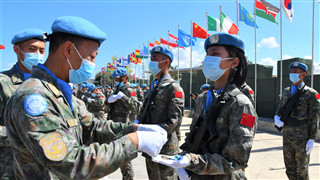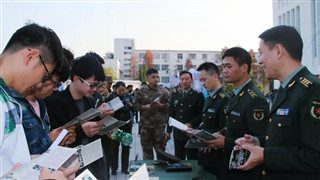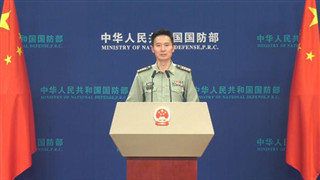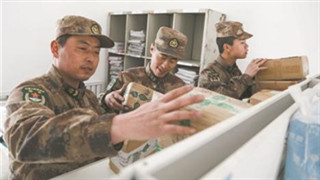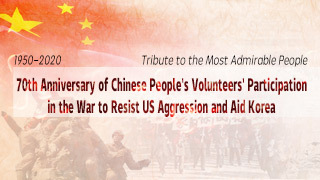by Xinhua writers Lyu Qiuping, Li Jingya and Pan Dexin
GUIYANG, June 17 (Xinhua) -- According to Luo Jianhua, 47, the key to the ultimate victory of the Long March more than 80 years ago lies in the perseverance of revolutionaries -- which he also deems the secret to becoming a successful entrepreneur.
From October 1934 to October 1936, the Chinese Workers' and Peasants' Red Army soldiers left their bases and marched through raging rivers, frigid mountains and arid grassland to break the siege of the Kuomintang forces and continued to fight the Japanese aggressors.
"Their strong will made the Red Army soldiers accomplish the march. It also inspires me to overcome difficulties and pull myself together in the face of hardships," said Luo, who was born and brought up in the city of Zunyi, southwest China's Guizhou Province.
In early 1935, the famous Zunyi Meeting held there became a crucial turning point of the Long March, which established the leadership of the new Central Committee of the Communist Party of China (CPC), as represented by Mao Zedong.
This year marks the centenary of the CPC. While China has embarked on a new journey to socialist modernization after eradicating absolute poverty, the spiritual legacy left by the Long March has been inspiring locals in their pursuit of rural vitalization.
RESOLUTE SPIRIT
When Luo was a child, Luo's father, a senior high school graduate, often told him the stories of the Red Army.
"I later found many of the stories in the textbooks in school," he recalled, adding that he still remembers some famous ones such as the "Old Mountain" that depicts how the Red Army soldiers managed to climb over a steep mountain.
"Through these stories, I have learned the virtues of persistence and perseverance," he said.
After he married Ding Qimei, his former classmate, in 1998, the couple was successively involved in multiple businesses, ranging from coal washing, pig farming to organic rice plantation.
Raising pigs was the toughest. The couple sometimes had to stay in the pigsty round the clock for a week, considering some 30 sows were due for delivery at the same time. Every day, the couple collected 500 kg of kitchen residue, which was processed into feedingstuff to lower costs. The strenuous workload took a toll on Luo's health and he had to be hospitalized.
"I couldn't make a fist or wiggle my fingers to open my hand. The doctor told me that the nerve was injured," Luo said. "But compared with the Red Army soldiers, what we went through was nothing."
In 2017, when Luo and Ding had become financially sound and stable, the couple set out on the route of the Long March to get an experience of the hardships of the Red Army. Using a sport utility vehicle and a horse named "Changzheng," meaning "Long March," they traveled for a year, traversing through 81 counties in 11 provincial-level regions.
During the journey Luo once narrowly escaped death in an accident -- he and the horse fell in a swamp.
"Luckily, the horse had long legs, and we struggled to get out," Luo recalled. "At that moment, I could imagine how dangerous the Long March was when the soldiers trekked through the wilderness with almost nothing to eat."
NEW JOURNEY
Since 2015, Zunyi has received nearly 240 million tourists coming to learn the revolutionary history, earning some 177 billion yuan (about 27.7 billion U.S. dollars) in revenue.
Among the popular resorts is the Loushan Pass, a mountain where the Red Army secured an important victory in 1935 during the Long March.
"I bring my son here so he could feel the tough circumstances under which the revolutionaries fought. It can help instill the value of patriotic spirit in him," said Pang Shuai, a 39-year-old tourist from Chongqing Municipality.
Other most visited sites include the venue of the Zunyi Meeting, the former headquarters of the Red Army, and the army's cemetery park.
Eyeing on red tourism, Wang Zhiqiang, a former migrant worker from Huamao Village in Zunyi, returned home and opened a restaurant.
"I have been extremely busy since the Spring Festival this year, with as many as 30 tables of guests dining in a single afternoon," said Wang, 60.
Huamao villagers sell their vegetables, fruits, fish and poultry meat to tourists. The per capita net income of the local farmers exceeded 20,000 yuan in 2020.
Apart from tourism, local special industries have contributed to the development of rural areas.
Dezhuang, a food processing company based in Chongqing Municipality, has set up a chili processing base in Zunyi.
The base was put into operation in August last year, and is expected to reach an output worth 200 million yuan this year, said Yue Qinsong, general manager of the company.
"We are confident to form a complete industrial chain that covers agriculture, production and sales," Yue said.
From 2016 to 2020, Zunyi saw an annual increase of 9.7 percent in terms of the rural per capita annual income.
In November 2020, the Guizhou provincial government announced that the last nine impoverished counties in the province had eliminated absolute poverty, marking that China achieved the feat of removing all remaining impoverished counties from the poverty list.
Last year, when the COVID-19 epidemic hit the country, Luo served as a volunteer, delivering food to quarantined people in a school. His son, Luo Haiyang, joined him in the volunteer team.
The young man, a student at Guizhou University, said he is inspired by the Long March soldiers and his parents, and often shares their stories with his classmates and friends.
"Many of our generation didn't go through hardships and get frustrated easily by setbacks. We should carry on the Long March spirit to sustain our perseverance," said the 22-year-old.
